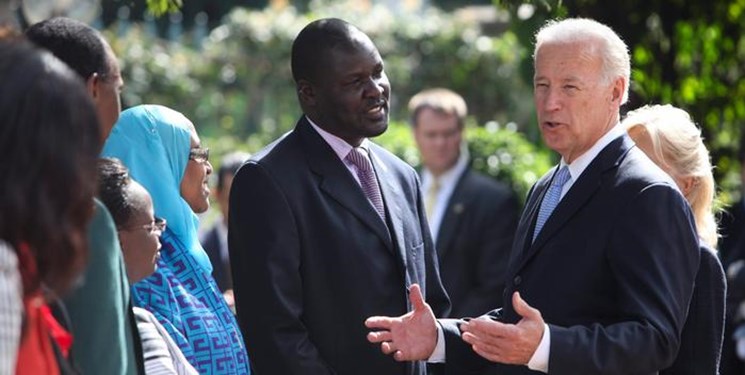Guest Note | Biden’s foreign policy for Africa; From competing against China to plundering the Black Continent.
A West Asian researcher believes that the current US administration is trying to continue its rivalry with China, even in Africa, in order to both thwart Beijing’s progress on the continent and plunder its resources.
Meysam Ghaffari Nejad, a researcher in the West Asia and North Africa Group, examined the Biden government’s foreign policy toward the African continent at the Expediency Council’s Strategic Research Institute.
In an exclusive note to Fars News Agency, Ghaffari Nejad wrote that in the Trump administration, he marginalized the development of relations with Africa by emphasizing the slogan “America First” and describing the African continent as “irregular countries”, signing the “Trade Agreement”. “With African countries,” he refused. Unlike previous US presidents, Trump did not travel to Africa and did not put the continent’s issues on the agenda closely; Rather, it was pursued through the circle of advisers and the cabinet of the government.
For example, John Bolton, the US National Security Adviser in 2018, spoke about the US strategy to help economic development and security on the African continent. In addition, under Trump, US aid to Africa was often part of congressional initiatives in areas such as the fight against AIDS and other humanitarian assistance, through the State Department and the United States Agency for International Development. In the context of competing with China on a large scale internationally, Trump also proposed a plan to encourage investment in Africa through the United States Agency for International Development; But the plan weighed less than China’s economic size and activity in Africa.
Biden’s approach and goals in Africa
Unlike under Trump, the new US president, Joe Biden, seeks to strengthen multilateralism around the world, putting Africa on his foreign policy agenda. Sending a video message to the African Union Summit in January 2021 highlights the importance of Africa in the White House policy apparatus.
During the Obama administration, Biden, as first vice president, announced his commitment to the Yali Young Leaders Initiative Initiative. The plan was designed to support young African leaders to grow and prosper on the continent, strengthen democracy and promote peace and security. Under the plan, four command centers were established in Senegal, Ghana, Kenya and South Africa, and by 2014, more than 500 young Africans had traveled to the United States as part of the Yali plan.
Biden is now pursuing the goal of strengthening multilateralism and balancing China. His first participation in an international event was to send a video message to the 34th Summit of the African Union, in which he called for the strengthening of multilateralism and the prospects for cooperation with African governments.
Balancing against China
In addition to multilateralism, trying to compete and balance with China is another reason for Biden to pay attention to Africa. Gregory Mix, chairman of the House Foreign Affairs Committee, warned of the need to change the US view of the African continent based on competition with China. According to Mix, Washington’s closed-mindedness to Africa has led to China and Turkey dominating the geography, leaving the United States behind in its rivalry with China on the continent. In this regard, the Biden government has taken a series of steps to strengthen its presence in Africa;
Cancel Donald Trump Executive Order
In the first days of his administration in January 2021, Biden issued a “travel ban” order imposed by the Trump administration in 2017 against citizens of eight countries, including Iran, Syria, Yemen, Libya, Venezuela, North Korea, and two African countries, Chad and Somalia. , Which reflects the Biden administration ‘s attitude towards Africa.
The appointment of Jeffrey Feltman, the former UN Under-Secretary-General for Political Affairs, as US Special Representative for the Horn of Africa, is believed to reflect Biden’s special interest in Africa. Feltman’s mission is to resolve three issues: the Ennahda Dam dispute, the Tigris climate crisis in northern Ethiopia, and the escalation of tensions between Sudan and Ethiopia.
Afrikam; US Headquarters in Africa
The US Command in Africa, known as “Africam”, is a US combat unit established under the auspices of the US Department of Defense. The unit was established in February 2007 by the Bush administration and is headquartered in Stuttgart, Germany. Facilitating military cooperation between the United States and African governments is the most important philosophy of this headquarters. In order to better manage and control its mission area, Africa has divided the African continent into five regions (North Africa, West Africa, East Africa, Central Africa and South Africa). According to statistics, the United States has 34 military bases across the African continent, most of which are located in North, Horn and West Africa (five bases in Niger).
With 2,000 troops, Djibouti is the largest US military presence in Africa. After this country, Niger, with 800 troops, is the second largest host of American troops. The US base in Somalia, with 400 troops, is Africa’s third largest base in Africa. Cameroon (with 100 troops) and Uganda (with 56 troops) are next. Has encountered. At US military bases in Djibouti, there are many drones involved in the Somali civil war and the Yemeni war.
The geographical attachment and geopolitical extension between Africa, the Arabian Peninsula and the Persian Gulf, as well as the continent of Europe, have connected the three continents. Realizing this situation, as well as the growing presence of China and other emerging powers on the African continent, Biden seeks to strengthen multilateralism. Given Africa’s rich mineral and natural resources and the fact that between 32 and 33% of the UN vote belongs to 54 African countries; Biden also discusses the use of the continent’s diplomatic and political weight in international forums. It should be noted that the balancing strategy against China, which is one of the key components of the Biden government’s foreign policy, is also pursued in the geopolitical sphere of Africa.









